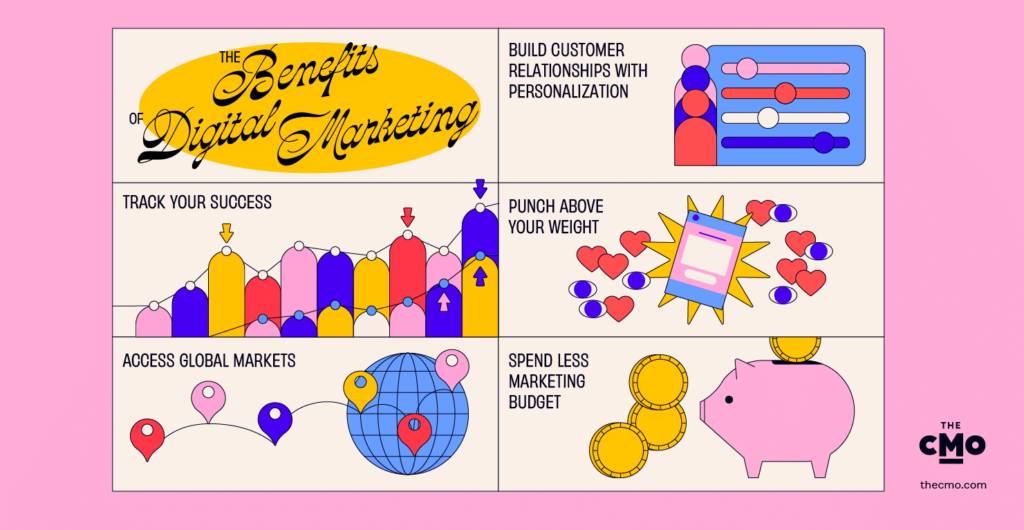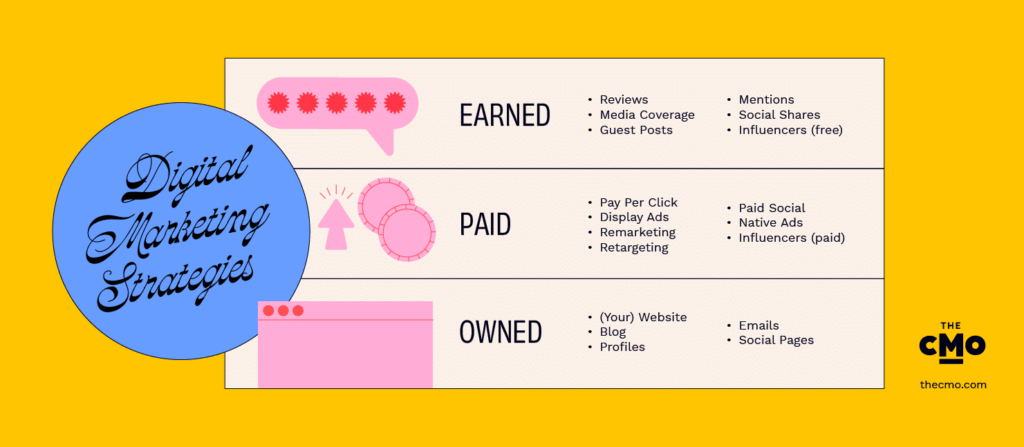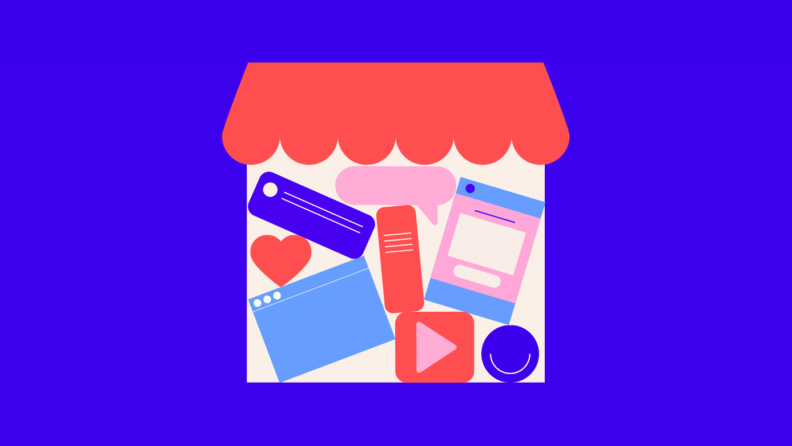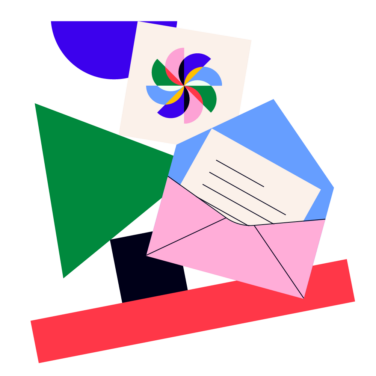As a small business, you simply can’t afford to ignore digital marketing, particularly when 87% of buyers now start their buying journey online.
Digital marketing can be an incredibly powerful tool, allowing you to compete with major players in your industry on a global scale. But as with every marketing technique, it can be expensive if not done correctly.
I have experienced first hand how challenging it can be to deliver an effective digital marketing strategy with limited marketing budget and resources. I have spent most of my marketing career working in small law firms, and have since become a small business owner myself, having recently started my own online shop. I’m always experimenting with new digital marketing techniques and software for small business marketing to help grow my brand, so read on as I share my findings.
What Is Digital Marketing?
In simple terms, digital marketing refers to any form of marketing which takes place online. This includes everything from email marketing and social media to SEO and online advertising.
With more and more consumers spending online, businesses are increasingly combining traditional and digital marketing techniques. For example, when CocaCola runs a print advertisement to promote a new drink, you will often see an accompanying advertising campaign on social media.

Why Is Digital Marketing Important For Small Businesses?
Digital marketing has leveled the playing field for small businesses. In the past, only large companies with big budgets could run newspaper ads or mail outs because they required massive marketing spend and teams to put the marketing assets together. Digital marketing allows businesses of all sizes to use data to run online or internet marketing campaigns quickly and cost effectively to a global audience. But those aren’t the only benefits:
- Build customer relationships with personalization - Unlike traditional marketing methods, digital marketing makes personalization easy and cost effective. For example, you can send out email campaigns which are personalized to a subscriber based on their location and past purchase, all at the click of a button. And it works—personalized email campaigns are reported to increase sales revenue by 20%.
- Spend less marketing budget - Possibly the most attractive thing about digital marketing is the lower costs. A print ad can run into thousands of dollars, while an online advertising campaign across social media channels will often be a fraction of that, making it far more accessible for small businesses.
- Track your success - The other massive benefit of digital marketing is how measurable it is, both in terms of results and investment. Using free tools such as google analytics, businesses of all sizes can track how effective an online campaign is in driving traffic to your website and delivering sales. Almost all marketing software comes with analytics allowing you to track the success of a campaign so you can accurately measure ROI. This is vitally important for small businesses which need to justify every marketing dollar.
- Access global markets - With digital marketing you can market to customers all over the world, no matter your size or where you're located. This opens up whole new markets for your business and allows you to compete with far bigger brands.
- Punch above your weight - With digital marketing, it’s not just about how much money you spend. If you’re lucky enough to have a blog post or tweet that goes viral, you could see your brand make an impression on thousands or even millions of potential customers. This is particularly true of TikTok where small businesses regularly trump established brands.

Earned Vs Owned Vs Paid Marketing Strategies
Digital marketing is a vast field so you’ll often find it broken down into three categories—earned media, owned media and paid media—which refer to different kinds of marketing assets. Let's look at them in more detail:
- Earned media marketing - this refers to the public profile which your business has earned, for example reviews of your product on a blog or on social media. As the name suggests, earned media can be a lot of work as it typically involves reaching out to online publications and influencers in the hope that they will talk favorably about your products. But it carries a lot of weight as it’s typically seen as more authentic than paid media and the upfront costs are far lower.
- Owned media marketing - this refers to online collateral which you create or manage, for example your website, social media accounts and online brochures. For most businesses, digital owned media like a website is essential.
- Paid media marketing - this refers to publicity which you pay for, for example through pay per click (PPC) campaigns on Google or things like affiliate marketing where you pay a blog to feature your products or link to your website. This form of marketing strategy can be highly effective but it can be very expensive and it doesn’t have the same authenticity that you get with earned media.
The Best Types Of Digital Marketing For Small Business
As we’ve discussed, there’s a huge range of techniques within digital marketing. When it comes to digital marketing for small businesses, however, we’re going to focus on marketing channels that will deliver the highest ROI (return on investment) for your budget.
Content Marketing
The aim of content marketing is to produce valuable content which builds trust and loyalty with your existing and potential customers. This in turn makes them more likely to purchase from you.
Typically, this will take the form of a blog, video series or online guide. With my ecommerce store, content marketing is one of the main marketing techniques I use. I regularly produce informational blogs and guides about chakra healing that potential buyers of my chakra candles might find useful. It’s low cost marketing and the ROI for my business is great.
Another benefit of content marketing is it can help with your SEO efforts, which we’ll get to discuss later in this guide.
Social Media Marketing
Social media marketing covers both paid and earned marketing strategies. For paid, you can run targeted advertisements such as Facebook ads that will only display to your ideal customers based on their location, interests and demographics. Although good social media management costs money, you can clearly track the conversion rate of your ads and make adjustments to them until you find the right advertising and targeting criteria to deliver a good ROI. You also don’t have to spend thousands of dollars to see results.
But you don’t have to spend money, which is where the earned marketing strategy comes in. Simply putting out great content on your social media consistently over time will help build your business profile and customer base. A lot of well known brands have grown rapidly using social media—the UK digital bank Monzo grew to 1 million users in just 2 years primarily off the back of its engaging social media strategy.
Feeling overwhelmed trying to keep up with all the platforms? Social media automation can help you upload once and schedule everywhere simultaneously.
Influencer Marketing
Influencer marketing is one of the quickest ways small businesses can build brand awareness among their target audience, and it works particularly well for direct to consumer (DTC) brands. The sportswear brand Gymshark gained a valuation of £400M in only 7 years largely through their wildly successful influencer program. Their strategy has involved partnering with carefully chosen social media influencers in the fitness world who have become ambassadors for their brand.
While some influencers charge exorbitant figures for collaborations, a lot of smaller brands see great results from working with nano and micro influencers (influencers with small but highly engaged audiences). Many of these nano and micro influencers will even promote your products for free providing they are a good fit for their followers.
Email Marketing
Over 60% of small businesses use email marketing to connect with their ideal customers, which isn’t surprising when you consider that email marketing has an incredibly high ROI (for some industries it’s reported to be as much as $36 for every $1 spent).
Because email is so prolific, email marketing is an effective digital marketing tool for almost all kinds of businesses. Thanks to the many great email marketing tools now available, we are able to target and segment audiences to get better response rates.
Email has been a really effective tool for me while working in marketing roles at law firms—I use email newsletters to update subscribers on the latest legal developments and case law which demonstrates the firm's expertise and helps build customer trust. And it’s one of the most cost effective and time efficient marketing channels, especially when combined with alternatives to email marketing out there like webinars and social media.
Search Engine Optimization (SEO)
These days, search engine optimization is a crucial part of any digital marketing strategy. It’s a broad term, but essentially means adopting techniques on your website which will help your business to rank high up in search engine results pages (SERPs).
SEO best practice is changing all the time, but generally it refers to using relevant keywords, producing good quality content and structuring your web pages so they are easily navigated by search engines such as Google and Bing.
The great thing about SEO is it can drive organic traffic to your website without costing you a thing, making it a great technique for small business owners. It can take time to see results, but if you consistently produce good quality content on your website which meets Google’s criteria then you could find your business appearing alongside far bigger businesses in the search results.
Google My Business
Did you know that 1.5 billion people visit destinations every month based on their Google searches? If you’re a location-based small business, you simply can’t afford to ignore Google My Business.
It’s simple and completely free to set up a Google My Business account—you just fill out your business details and that’s it. Once your profile is live, it’s important to get some customer reviews (87% of consumers chose a local business based on Google reviews in 2022.) I used to have a local events business and I would always send customers an email with a link to my Google profile after an event had taken place to ask for a review.
Additional Types of Digital Marketing
The techniques above are some of my favorite digital marketing methods for small business because they don't require significant marketing spend, but they are not the only options. You could also consider:
Online Marketing (Paid Advertising)
Paid advertising, often referred to as Pay Per Click (PPC), can be very expensive—Walmart spent an eye-watering $331 million on digital advertising in 2021! But that doesn’t mean you should avoid it altogether. The most important thing is to get really clear on how much you can afford to spend. Consider what your target customer acquisition cost is, then select the most suitable platform for reaching your target audience.
Of course, cost also depends where you advertise. For example, advertising on LinkedIn is typically very expensive, however If you sell on Amazon, then you’ll find that the PPC on certain products and categories can actually be quite affordable. By tracking your spend and conversion carefully you can make sure that you’re staying within your marketing budget and delivering ROI.
Mobile Marketing
Over half of all website traffic is now generated from mobile phones, so mobile marketing has huge reach potential. Mobile marketing refers to any form of marketing that targets consumers on their phones, including promotional push notifications, in-app advertisements, location based advertisements, and SMS and MMS messaging.
Ads via SMS marketing software have great reach and can feel more personal and interactive than other forms of advertising, which all helps with conversion. If you don’t have the budget for ads, you can still leverage the power of mobile by ensuring that your business website and digital marketing campaigns are mobile friendly.
Video Marketing
Take a look at the brands that have become viral sensations in recent years and you’ll find that most of them use video marketing. Dollar Shave Club is a great example of this—their iconic launch video secured them 12,000 new subscribers within 24 hours, paving the way for massive future growth.
Dollar Shave Club’s launch video was reported to cost around $4,500 to create, but you can still use video marketing, even without that sort of budget. You can start creating YouTube videos simply by talking to the camera on your phone, or repurpose content you are already creating. In my role as a marketing manager, I would regularly record industry seminars we hosted and share clips of the videos on social media to build our credibility.
And let’s not forget about user-generated video content. UGC has a much higher conversion rate than other forms of marketing because consumers trust it 50% more than brand-created content. Make it easy for your customers to talk about your brand by telling them where to share videos, what hashtags to use and incentivise them with discounts or giveaways for the best content.
Podcasting
There were a staggering 464.7 million podcast listeners around the world in 2022. Like video, podcasting can be really expensive if you spend a lot on production, but if you’re happy to do a lot of the work yourself, you can get all the equipment you need for as little as a few hundred dollars.
Podcasting isn’t suitable for all brands, but for services businesses like marketing agencies, training services or consultants, it can be a great way to share your expertise with potential customers and build brand trust.
Developing Your Small Business Marketing Strategy
Consider Your Target Market
Before creating any marketing strategy, it’s essential to think about your target audience. What social media platforms do they use? What sort of content do they look for? What matters to them?
As a marketer in the legal services industry, my target audience probably won’t be found watching Snapchat videos, but they are likely to read industry updates on LinkedIn. Once you know this information, you can choose which digital marketing channels to focus on and what forms of content to create.
Consider Your Size and Resources
You can’t do everything and be everywhere. Don’t just think about how much marketing spend you have available—consider the time it will take to produce content and manage your online presence.
Paid ads often require less time to run and manage but more upfront cost, while creating social media content can be cheaper but time consuming for you and your marketing team. I recommend starting with a couple of channels and then building from there once you have processes in place.
Define Your Marketing Goals
In order to determine the success of your digital marketing, you first need to have clear goals for your campaigns. For example, are you looking to build awareness of your product in a particular geography? If so, then perhaps you could track the number of new email subscribers you receive from this area over a given period of time.
Or if you’re focused on sales, then you could look at the number of sales coming from a paid ad campaign on a particular social media channel. When coming up with goals, make sure they are specific and clearly defined.
Set Realistic Timelines and Budgets
Once you have your goals, you can put together a marketing plan for your digital strategy. It can take time to gain traction online so you need to be realistic, both in terms of what you can achieve and what you can budget for—some industry reports suggest it can take 6 months to see meaningful results from a digital marketing strategy.
I usually come up with a timeline and a budget for what I can afford to spend over the course of the campaign and then I’ll use marketing software to help me stay on track. For example, I use the content marketing tool Ahrefs to plan the content for my chakra healing blog and to monitor the success of individual articles.
Leverage Digital Marketing Tools
The beauty of digital marketing is there are so many digital marketing apps and software out there all designed to make your life easier. For example, you can use email marketing automation tools like Mailchimp so you’re not having to come up with new email templates all the time and use social media scheduling tools like Hubspot to preload all your social media posts in bulk to save you time day to day.
Whatever your digital marketing requirements, it’s safe to say there will be a range of tools out there to help you. A lot of these tools have low cost pricing options for small businesses and start up entrepreneurs—some even come with freemium options when you’re just starting out.
Repurpose Content
Marketing for small businesses is all about making the most of your budget and resources which is why I’m a massive advocate for repurposing content wherever possible.
This is really easy to do with digital marketing. For example, if you produce a blog post, then make sure you share it across your other digital platforms—this could include featuring it in an email newsletter, creating infographics from the article which could be shared on social media or even producing a short Youtube video based on the contents of the article.
By sharing it across all these different channels, you’re reaching as wide an audience as possible for the minimum amount of effort.
Track, Measure And Adjust
Lastly, don't forget to track and measure the results of your marketing efforts. This is particularly important if you’re spending money on advertisements. When I run PPC campaigns on Amazon for my chakra candles, I check the campaigns every day and adjust the spend to ensure I’m not blowing through my advertising budget.
Using digital marketing platforms like Monday make it easy to keep on top of all your campaigns, performance metrics and where you need to make tweaks to boost conversion.
Start Marketing Your Small Business
Digital marketing is a gamechanger for small businesses, so start thinking about what you can incorporate into your marketing strategy today. To help you on your way, have a look at our round up of the 10 best small business marketing software. And don’t forget to subscribe to the CMO newsletter for more marketing tips and insights!



